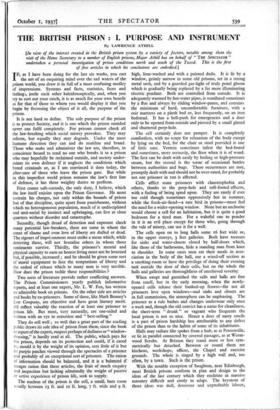THE BRITISH PRISON : I. PURPOSE AND INSTRUMENT
By LAWRENCE ATHILL
[In view of the interest created in the British prison system by a variety of factors, notable among them the visit of the Home Secretary to a number of English prisons, Major Atkin has on behalf of " THE SPECTATOR " undertaken a personal investigation of prison conditions north and south of the Tweed. This is the first of five articles in which his conclusions are embodied.] IF, as I have been doing for the last six weeks, you cast the net of an enquiring mind over the sad waters of the prison world, you draw it in full of a most confusing medley of impressions. Systems and facts, statistics, faces and feeling3, jostle each other kaleidoscopically, and, when you try to sort out your catch, it is as much for your own benefit as for that of those to whom you would display it that you begin by focussing the object of it all, the purpose of the prison.
It is not hard to define. The sole purpose of the prison is to protect Society, and it is one which the prison unaided never can fulfil completely. For prisons cannot check all the law-breaking which social misery provokes. They may reform, but equally they may degrade. Under the most humane direction they can and do mutilate and brand. Those who make and administer the law are, therefore, in conscience bound to send no one who breaks it to a prison who may hopefully be reclaimed outside, and society under- mines its own defence if it neglects the conditions which breed criminals or, as I am convinced it does today, the after-care of those who leave the prison gate. But while in this imperfect world prison remains the law's first line of defence, it has three weighty duties to perform.
First comes safe-custody, the only duty, I believe, which the law itself enjoins upon the Prison Governor. He must restrain his charges, not only within the bounds of prison but of that discipline, quite apart from punishment, without which no heterogeneous population, much of it undisciplined and anti-social by instinct and upbringing, can live at close quarters without disorder and catastrophe.
Secondly, though dread of detection and exposure check many potential law-breakers, there are some in whom the sense of shame and even love of liberty are dulled or dead. The rigours of imprisonment must strike a mean which, while deterring these, will not brutalise others in whom those sentiments survive. Thirdly, the prisoner's mental and physical capacity to earn an honest living must not be lessened but, if possible, increased ; and he should be given some sort of moral equipment to face the temptations of liberty and the ordeal of release which to many men is very terrible. How does the prison tackle these responsibilities ?
Two sorts of literature provide rather conflicting answers. The Prison Commissioners yearly publish informative reports, and at least one expert, Mr. L. W. Fox, has written an admirable book on prisons. On the other side are articles and books by ex-prisoners. Some of these, like Mark Benney's Low Company, are objective and have great literary merit. All reflect valuably the reaction of at least one prisoner to prison life. But most, very naturally, are one-sided and ritten with an eye to sensation and " best-selling."
They do sell well ; so well that a great part of the reading public draws its sole idea of prison from them, since the book or report of the expert, suspect perhaps of dullness or " window- dressing," is hardly read at all. The public, which pays for the prison, depends on its protection and could, if it cared to, mould it by the weight of its opinion, sees little of it but its purple patches viewed through the spectacles of a prisoner and probably of an exceptional sort of prisoner. The ration of information should be balanced, and it is a balanced if meagre ration that these articles, the fruit of much enquiry and inspection but lacking admittedly the weight of passive or active experience of prison life, seek to supply.
The nucleus of the prison is the cell, a small, bare room tsually between 13 ft. and to ft. long, 7 ft. wide and 9 ft. high, lime-washed and with a painted dado. It is lit by a window, grimly narrow in some old prisons, set in a strong metal sash, and by a guarded gas-light of truly penal gloom which is gradually being replaced by a far more illuminating electric pendant. Both are controlled from outside. It is adequately warmed by hot-water pipes, is ventilated sometimes by a flue and always by sliding window-panes, and contains the minimum of hard, uncomfortable furniture, with a coir mattress on a plank bed or, less frequently, on an iron bedstead. It has a bell-push for emergencies and. a door only to be opened from outside and pierced by a small glazed and shuttered peep-hole.
The cell certainly does not pamper. It is completely comfortless, with no scope for relaxation of the body except by lying on the bed, for the chair or stool provided is one of little ease. Vermin sometimes infest the bed-board and sometimes, more seriously, the floor when it is of wood. The first can be dealt with easily by boiling or high-pressure steam, but the second is the scene of occasional battles between authorities and bugs. These occurrences are rare, promptly dealt with and should not be over-rated, for probably not one prisoner in too is affected.
Cells afflict some prisoners with claustrophobia and others, thanks to the peep-hole and soft-footed officers, with a feeling of being spied upon. They are rarely if ever too cold though sometimes oppressively hot in summer, while the fresh-air-fiend—a rare bird in prisons—must feel the need for a wider-opening window. None but an anchorite would choose a cell for an habitation, but it is quite a good bedroom for a tired man. For a wakeful one to ponder in it is an evil place except for those who, going through the vale of misery, can use it for a well.
The cells open on to long halls some 16 feet wide or, in the upper storeys, 3 feet galleries. Both have recesses for sinks and water-closets closed by half-doors which, like those of the bathrooms, hide a standing man from knee to shoulder. In some cases men eat their meals in asso- ciation in the body of the hall, use a wired-off section as a smoking-room or have the privilege of doing their evening task outside the door of their cells, but on the whole the halls and galleries are thoroughfares of unrelieved severity.
When swept and garnished the cells and halls are free from smell, but in the early morning, when the newly- opened cells release their banked-up frowst—for not all prisoners love open windows—and sinks and closets are in full commission, the atmosphere can be unpleasing. The prisoner as a rule bathes and changes underwear only once a week and, though the old convict has a name for cleanliness, the short-term " drunk " or vagrant who frequents the local prison is not so nice. Hence a dose of nasty smells is a part of prison hardship less attributable to any defect of the prison than to the habits of some of its inhabitants.
Halls may radiate like spokes from a hub, as at Pentonville, or lie in parallel connected by covered passages, as at Worm- wood Scrubs. At Brixton they stand more or less sym- metrically but detached. Between or round them are kitchens, workshops, offices, the Chapel and exercise grounds. The whole is ringed by a high wall and, too often, by a town. Such is the prison.
With the notable exception of Saughton, near Edinburgh, most British prisons conform in plan and design to the ideas of the last century which they enshrine in massive masonry difficult and costly to adapt. The keystone of those ideas was dull, deterrent and unprofitable labour, performed in the solitude of cells with intervals of exercise in small and subdivided yards. The space encircled by the wall was correspondingly restricted. Modern ideas aim at giving the prisoner the minimum of cell confinement, at occupying his mind as well as his body by useful and, if possible, instructive tasks in association with his fellows and at giving him a modicum of out-door work to keep him fit and incidentally to provide at low cost the vegetables essential to his health. To accommodate suitable workshops, lecture- rooms and the like, and to permit agriculture or gardening, considerable space is needed. In some cases the original area sufficed for the new shops, and additional acreage for further shops and agriculture has been acquired and has been or is being walled in. But in places like Pentonville, with its population of 700 and its to acres largely covered by buildings and hedged round by London, expansion is quite impossible and the development of modern ideas proportionately cramped.
To sum up on the material aspect of the British prison, which bears on its efficiency as the quality of a violin does on the music it can be made to produce, the structure of, I believe, all is good. The design and plan of most are not ideal but adequate to their purposes. The area of some of the most important is badly cramped, and the improve- ment of those in the middle of large towns is seriously handi- capped by their situation.
Dartmoor is a special case. Its 1,60o acres are wide enough in all conscience for its 300 or so inhabitants. These do not, as many people think, live in the same quarters as did the prisoners of war 140 years ago, but in quite good buildings mostly reconstructed since 1890. But its dis- tance from the world makes the visits of voluntary workers difficult, and those of the men's friends and relatives well-nigh impossible. Fog, however, is its greatest enemy, often wrapping it in a damp impenetrable shroud and driving the prisoners from their outdoor work into their cells or over- crowded shops. Work-programmes are upset, nerves of officers and convicts begin to twang, and " reports "—sure indices of discontent—multiply. If these drawbacks are disqualifying—which I personally doubt, since the visiting diffi- culty might be met by a compassionate grant—there is nothing for it but to move the prison, for you cannot move the fog.
The question of material improvement hangs on money. Given it the Prison Commissioners, probably the sanest and most zealous prison reformers in the kingdom, can be trusted to make the prison a better instrument for their tune. But would it not be better spent in mending the conditions which fill prisons ? Personally I should vote for some expenditure on both, but certainly the lion's share on the latter.
One point more, before turning to the human side of the problem. Near Wakefield an interesting experiment, of which more must be written, is being carried out with an unwalled prison camp tenanted by selected first-offenders. At Saughton the Scottish Prison Department has built an " open " prison, housing a very mixed population with success. The notion of unwalled prisons is in the air. To those considering it I suggest two thoughts. It is perhaps human- ising for the prisoner to look at the outside world. Is it quite so humanising for him to be looked at by it? Secondly, we were taught as children not to tempt people by leaving money lying about. The prisoner, walled or unwalled, is denied freedom and punished if he takes it. Is it fair or kind to him to leave too much of that lying about ?







































 Previous page
Previous page